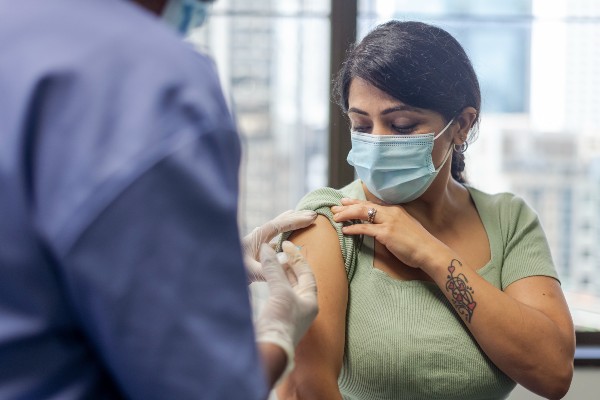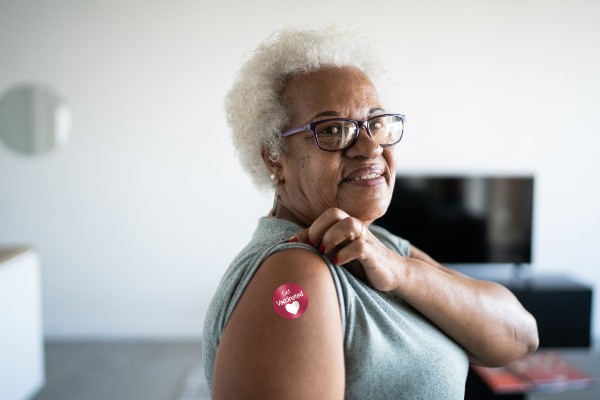Earlier this week, U.S. Food and Drug Administration (FDA) approved the first COVID-19 vaccine. Previously, the vaccine was known as the Pfizer-BioNTech COVID-19 Vaccine. The vaccine is now being marketed as Comirnaty and is intended for the prevention of COVID-19 disease in people who are 16 years of age and older.
Comirnaty also continues to be available under emergency use authorization (EUA), including for individuals 12 through 15 years of age and for the administration of a third dose in certain immunocompromised individuals.
What Does FDA Approval Mean for Me and My Family?
“FDA approval of the Comirnaty vaccine is an exciting milestone as our nation continue to fight the COVID-19 pandemic, including new virus strains and the Delta variant,” says Cindy Williams, Vice President of Pharmacy for Riverside Health.
As the first FDA-approved COVID-19 vaccine, Americans can now feel confident because the vaccine meets the FDA’s high standards for safety, effectiveness, and manufacturing quality.
Health officials now consider COVID-19 to be a pandemic of the unvaccinated. Coronavirus has killed more than 625,000 Americans, and hospitals across the United States have reached full capacity as patients from another surge are occupying beds and emergency rooms across the nation.
How Does Comirnaty Work?
Comirnaty contains messenger RNA (mRNA), which is a type of genetic material. The mRNA is used by the body to imitate one of the proteins in the virus that causes COVID-19. When you receive this vaccine, your immune system will ultimately react defensively to the virus that causes COVID-19.
The mRNA in Comirnaty only stays in the body for a short time and is not incorporated nor alter an individual’s genetic material. Comirnaty has the same formulation as the Pfizer EUA vaccine and is given to people as a series of two doses, which are administered three weeks apart.
Where Can I Get a Vaccine?
Riverside began offering COVID-19 vaccines to healthcare workers and members of the public in December 2020 and continues encouraging vaccine hesitant people to take the important step of scheduling a vaccine.
“The most important reason to get the vaccine is to protect yourself from getting very sick or dying from COVID 19. The vaccines approved for use in the U.S. help your body develop antibodies that fight COVID 19, which helps prevent anyone from getting severely ill,” says a Williams.
Take action today and schedule your vaccine at Riverside. You can use this vaccine scheduling tool for your first vaccine dose or your additional booster dose if you are immunocompromised.
I’m Immunocompromised. Can I Get an Additional Vaccine Dose?
People who are moderately to severely immunocompromised are especially vulnerable to COVID-19 because they are more at risk of serious, prolonged illness
According to CDC, people who have moderately to severely compromised immune systems may not build the same level of immunity to 2-dose vaccine series compared to people who are not immunocompromised.
- CDC recommends people who are moderately to severely immunocompromised should receive an additional dose of mRNA COVID-19 vaccine after the initial 2 doses.
- This additional dose is intended to improve immunocompromised people’s response to their initial vaccine series is not the same as a booster dose, given to people when the immune response to a primary vaccine series is likely to have weakened over time.
- CDC recommends that people with moderately to severely compromised immune systems receive an additional dose of mRNA COVID-19 vaccine at least 28 days after a second dose of the Pfizer or Moderna vaccine. The Janssen Johnson & Johnson (J&J) vaccine does not currently have enough data to determine if a booster is necessary.
- If you aren’t sure if you are immunocompromised, talk with your healthcare provider. Your doctor can provide the best advice based on your personal health and medical history.
Can My Child Get Vaccinated?
According to CDC, while fewer children have been infected with COVID-19 compared to adults, children can still:
- Be infected with the virus that causes COVID-19
- Get sick from COVID-19
- Spread COVID-19 to others
CDC recommends everyone 12 years and older should get a COVID-19 vaccination to help protect against COVID-19.
Widespread vaccination is an important tool to help stop the pandemic. What’s more, children age 12 years and older can get the Comirnaty (formerly Pfizer) vaccine. Children between the ages of 2 and 12 should wear a mask in public spaces and around people they don’t live with. Talk to your child’s pediatrician if you have specific concerns about your child or teenager and their vaccination status.
What Else Should I Know?
Here’s what you should know about FDA approval of the Pfizer vaccine:
- The U.S. Surgeon General said that the FDA’s full approval of the Pfizer vaccine will likely cause more colleges and businesses to require the immunizations for students and employees.
- The FDA had previously set an unofficial deadline for approval by Labor Day. However, increasing COVID-19 cases have posed a threat to the health and safety of Americans.
- The approval of Comirnaty will help support a series of vaccination requirements by public and private organizations who were waiting for regulatory approval before employing vaccine mandates.
- Public health experts hope that a full approval will push more Americans to get their shots.
- The FDA full approval is good news, especially because schools, universities, and other public entities are seeing an increase in COVID-19 cases due to the Delta variant.



